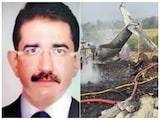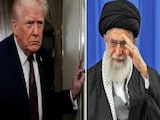The four terrorists involved in the April 22 Pahalgam attack, in which 26 people were killed, remain on the run. NIA sources said they may be hiding in dense forests in south Kashmir and use encrypted communications devices.
The four terrorists who shot and killed 26 people in Pahalgam in south Kashmir on April 22, and who have been on the run since - evading a massive manhunt involving the military and local police - are likely still in the area, sources in the National Investigation Agency have told NDTV.
NIA sources said the terrorists may be 'self-reliant', i.e., be carrying provisions, and therefore stay hidden in the dense forests, which could explain why they had avoided detection so far.
This would also obviate the need for external logistical support that would most likely be provided by Pakistan, which New Delhi has accused of involvement in the Pahalgam attack.
Anti-terror agency NIA has taken over the investigation into the worst terror attack in India in recent years, certainly since February 2019, when 40 soldiers were killed in J&K's Pulwama.
Initial inquiries indicate the terrorists were present in Baisaran Valley - a picturesque meadow and tourist hotspot near Pahalgam and where the attack took place - at least 48 hours earlier.
NIA sources said OGWs, or Over Ground Workers, or terrorist sympathisers, interrogated after the attack said they recced four other locations. These included the Aru and Betaab valleys.
READ | Terrorists Scouted 3 Other J&K Sites Before Pahalgam Attack: Sources
But all of them were heavily guarded and so the terrorists picked Baisaran. Questions have since been asked by the opposition about the lack of military presence, as a deterrent.
Intelligence agencies believe the terrorists had advanced comms equipment; Major General Yash Mor, a retired defence expert who served in Kashmir, had flagged this to NDTV.
NDTV Exclusive | Pahalgam Attack Explained By Defence Expert Who Was In J&K
The equipment used, sources said, did not need SIM cards and was capable of short-range encrypted transmissions, making it difficult, if not impossible, for it to be intercepted.
As many as three satellite phones were reportedly used by the terrorists, possibly to mask their positions and keep Indian security forces off guard till the attack, which began at 1.15 pm.
The attack plan was simple - three terrorists sprang from hiding places around Baisaran to open fire at the tourists, while the fourth stayed hidden to provide back-up, if necessary.
Deserted scenes from Baisaran Valley, the attack site.
Sources have said there may even have been other terrorists hiding nearby.
Witnesses reported the terrorists interrogated some victims - all of whom were men - asking them to recite Islamic verses. Those who failed were shot at point-blank range.
Horrific videos from after the attack soon emerged online, showing women with their faces covered in the blood of their husbands and partners, pleading for help. One terrorist sneered at a woman whose husband he had just killed, saying, "Go tell (Prime Minister Narendra) Modi."
Among the 26 men who were killed was a Nepali citizen. Another was a Navy officer on his honeymoon; he had been married less than a week ago. Yet another was a 70-year-old man from Andhra Pradesh. A fourth was a 35-year-old Karnataka family man who begged for his life.
READ | "Telling The World...": PM's Big Warning On Terror, In English
The attack was met with horror from around the world, and Mr Modi vowed vengeance, not just against those who pulled the triggers but also those who planned the attack. Terrorism's evil agenda would not be allowed to succeed, he said, putting Pak and its terror network on notice.
India's initial response was a flurry of diplomatic restrictions, including expelling Pak nationals from the country and suspending the Indus Waters Treaty. The IWT is a critical water-sharing deal that supplies Pakistan, also an agrarian nation, with over 80 per cent of its water supply.
Pak responded by also expelling Indians and suspending the Simla Agreement.
The two countries have also shut their airspaces to the other's planes.
India is also expected to launch a military response.
On Wednesday the PM chaired a high-level meeting with Defence Minister Rajnath Singh, National Security Advisor Ajit Doval, and Chief of Defence Staff General Anil Chauhan. Sources said Mr Modi gave the armed forces the greenlight to plan and execute a counterattack.
READ | PM's Free Hand To Forces To Decide Military Response to Pahalgam
Meanwhile, Pakistan continues to violate the ceasefire agreement.
This morning the Pak Army carried out unprovoked small arms fire in the Kupwara, Uri, and Akhnoor sectors, drawing a proportionate response from India. This is the seventh straight night of Pak fire.
With input from agencies
NDTV is now available on WhatsApp channels. Click on the link to get all the latest updates from NDTV on your chat.















